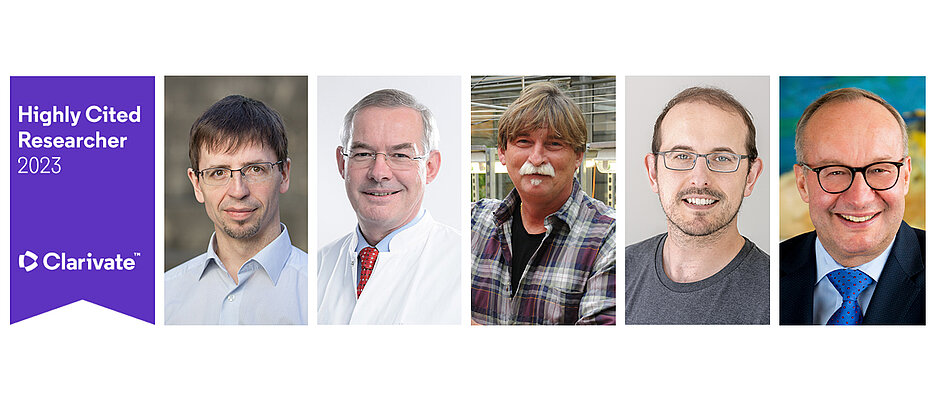Highly Cited Researchers 2023
11/15/2023Their work is most frequently cited in publications of other scientists. Researchers from the University of Würzburg are therefore included in the Highly Cited Researchers 2023 list.

Once again professors of Julius-Maximilians-Universität Würzburg (JMU) in Bavaria, Germany, are on the list of Highly Cited Researchers: Botanist Rainer Hedrich, medical scientists Hermann Einsele and Christoph Wanner, cell researcher José Pedro Friedmann Angeli, and system biologist Dominic Grün.
The current Highly Cited List was established by Clarivate Analytics, a company specialising in citation data, and published on November 15th, 2023. The analysis is based on the Web of Science database. For their 2023 assessment, the analysts looked at the time between 2012 and 2022.
Highly cited papers rank in the top one percent of most-cited publications in their field in the year of publication. Only such scholars who have co-authored particularly multiple highly cited papers may join the ranks of "Highly Cited Researchers" comprising 7,125 scientists from 67 countries in 2023.
JMU President Congratulates
JMU President Paul Pauli congratulates the researchers: "The fact that Würzburg scientists are repeatedly among the Highly Cited Researchers is impressive proof of the international visibility of our university. Congratulations to the honourees!"
Prof. Dr. Hermann Einsele
The head of the Chair of Internal Medicine II and director of the Medical Clinic and Polyclinic II is an expert in stem cell transplantation against blood cancer and multiple myeloma and infectious diseases in immune-compromised patients. Immunotherapeutic studies for many tumour diseases are underway under his direction. Einsele has developed a cancer therapy with specifically modified immune cells and used it clinically for the first time in Europe. He has received the 2003 van Bekkum Award of the European Society for Cell and Stem Cell Therapy, 2012 Nobel Lecture Stem Cell Biology/Transplantation, Nobel Forum Karolinska Institute Sweden. In 2014 he was accepted as a member of the Academy of Sciences and Literature Mainz. In 2022, he was the first European to receive the prestigious Erasmus Hematology Award for special achievements in cancer immunotherapy as well as the Bavarian Constitutional Order and in 2023 the highest prize of the German Society for Transfusion Medicine and Immunohematology (DGTI), the Emil-von-Behring Lecture. He is co-spokesperson of the Collaborative Research Centres 124, 221, and 338 and spokesperson of the National Centre for Tumour Diseases WERA with headquarters in Würzburg.
Prof. Dr. José Pedro Friedmann Angeli
The Professor for Translational Cell Biology at the Rudolf Virchow Center for Integrative and Translational Bioimaging at the University of Wuerzburg is a pioneer in the field of ferroptosis, a recently described cell death modality involved in an evergrowing list of (patho)physiological processes. Work in his group aims to understand and exploit specific metabolic pathways that regulate ferroptosis sensitivity. Their long-term goal is to exploit this knowledge to selectively target these key survival pathways in cancer entities inherently sensitive to ferroptosis, including B-cell malignancies, melanomas and neuroblastomas.
Prof. Dr. Dominic Grün
The head of the JMU Chair for Computational Biology of Spatial Biomedical Systems and director at the Institute of Systems Immunology investigates processes of cell differentiation in bone marrow and liver tissue using high-resolution methods. His research group has developed numerous bioinformatics algorithms to decipher data obtained with single-cell RNA sequencing. Using these methods, the physicist was able to create the first cell type atlas of the human liver and contribute to a better understanding of tissue architecture and cell differentiation in the liver. His work was awarded the GlaxoSmithKline Prize for Basic Medical Research in 2020. His research on the tissue architecture of the bone marrow has been funded by a two-million-euro ERC Consolidator Grant from the European Research Council since 2019.
Prof. Dr. Rainer Hedrich
The head of the Chair of Botany I – Molecular Plant Physiology and Biophysics is considered one of the fathers of researching electric signal transmission in plants. He has been included in the list of Highly Cited Researchers continuously since 2003 – two decades of outstanding research at the university. He was the first researcher worldwide to determine the functioning of plant ion channels in the laboratory of Nobel Laureate Erwin Neher. Hedrich studies carnivorous plants within the scope of the "Carnivorom" project funded by an ERC Grant of the European Research Council. Among other things, he discovered that the Venus flytrap counts the number of times it is touched by its prey and only allows the trap to shut and digest after a sufficient number of stimuli. To find out how the plant counts, the German Research Foundation is funding Hedrich with the renowned Koselleck Research Award. In recent years, he has used light-activated ion channels to expose experimental plants to different numbers of external calcium-electric stimuli in order to elucidate the mechanism of plant counting.
Prof. Dr. Christoph Wanner
The former Head of Nephrology at the Medical Clinic and Polyclinic I of Würzburg University Hospital is an expert in kidney disease in diabetes mellitus and cardiovascular disease in dialysis patients and after kidney transplants. Through worldwide clinical studies, he was able to show for the first time that a drug that is effective in the kidney can significantly delay the progression of kidney disease in diabetics up to renal replacement therapy. His work also focuses on the diagnosis, prognosis and treatment of lipid metabolism disorders in kidney patients. He was awarded the Franz Volhard Medal in 2018. He has been a senior professor at JMU since the beginning of 2023.






